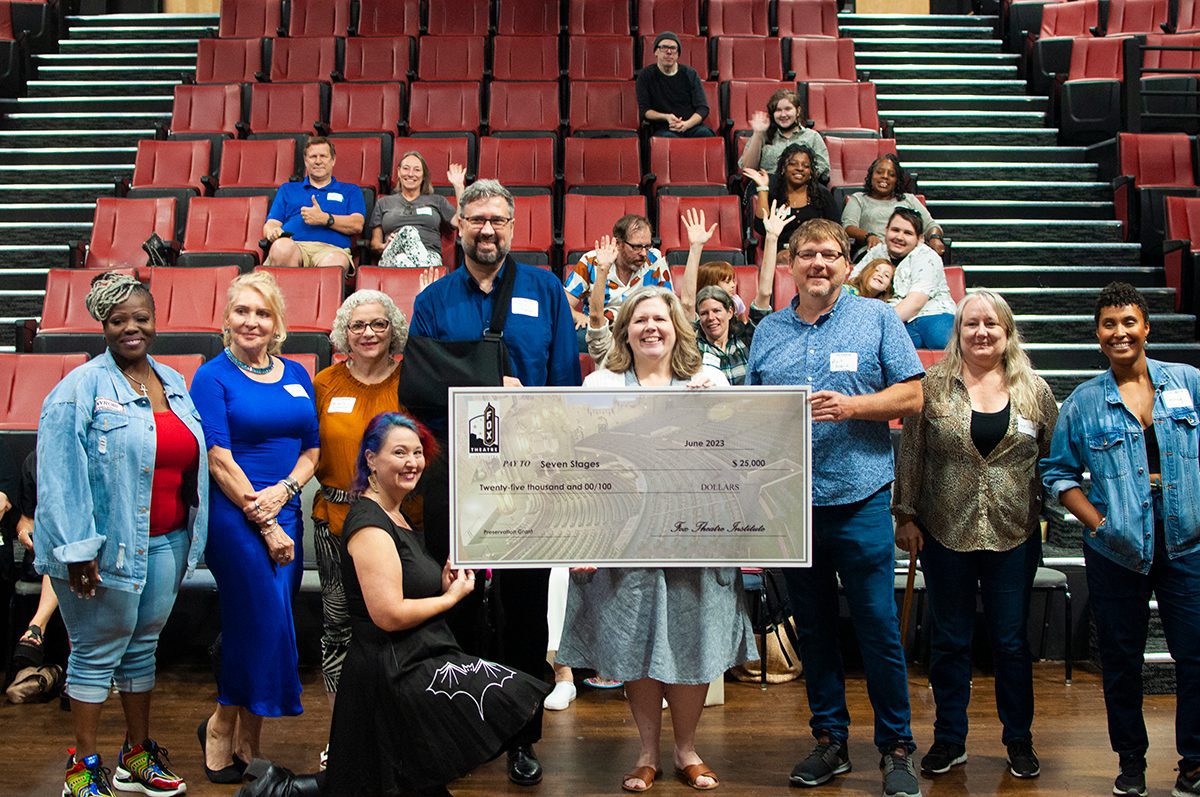Renovations at 7 Stages improve audience comfort and accessibility
In Fall of 2022, 7 Stages received funding from Fox Theatre Institute’s Preservation Grant and Georgia Council for the Arts’ Cultural Facilities Grant, as well as many individual donors. In addition, local hero Christopher Escobar donated gently used seats from a recent renovation at The Plaza Theatre. Renovations are underway in May and June of 2023, and will result in improved audience experience and accessibility for both performance spaces in our historic facility.
Mainstage work includes new seating, new carpet, and wider stairs with handrails greatly improving audience comfort and allowing more autonomy for patrons. The BackStage Theatre space received new seating risers that are more stable, have wider stairs, and include structural handrails. These improvements will not only make it safer for patrons, while improving access and comfort, but will also significantly reduce costs and increase artistic flexibility, making our BackStage Theatre a true black box.
In 1979, 7 Stages began producing in a small storefront around the corner from our current home. In the early 1980s, 7 Stages expanded significantly, taking over the pool hall next door and nearly doubling the interior space. Shortly thereafter, additional space was needed, and our current home became available. Local legends Don Bender and Kelly Jordan leased the current facility to founders Del Hamilton and Faye Allen. In 1996, a $1.4 Million capital campaign allowed 7 Stages to purchase the facility, build the permanent Mainstage seating, connect the BackStage space to the central interior via a new hallway, and add offices among other improvements that gave the building its current layout.
The facility was originally built in the 1940s as a movie theater, one of several Storey Theatres, and has gone through myriad improvements before and after the purchase in 1996. Improvements throughout the 2000’s included replacing the roof while adding much needed insulation increasing the R Value significantly; restoring the Marquee and changing the the power hungry 10’ long fluorescent tubes out for energy efficient LED; changing most facility lighting over to LED throughout the building; adding equipment and infrastructure to change the majority of stage lighting in the Mainstage over to LED; replacing all 4 HVAC systems to more efficient units while automating controls for further cost and energy savings; renovating public restrooms and creating non-binary gender options, plus upgrading to more energy-efficient appliances.
7 Stages intended to embark on a typical Capital Campaign to raise all the funding and undergo a great deal of the renovations all at once during an extended closure. The 2008 recession required a new plan, and the Asset Restoration Campaign was born. A constantly evolving facility needs list was created, prioritized, and grouped into sensible buckets. A phase was selected, funds were raised, and projects completed. Meanwhile the list was constantly updated, prioritized, grouped together, and funded. In this way, we are able to manage the facility, ensuring it remains a vital arts center for our community.
Many of these renovations were made possible by The Community Foundation’s Grants to Green initiative and previous contributions from The Fox Theatre Institute, The Woodruff Foundation Lettie Pate Evans, The Tull Foundation, AEC Trust, Woodward Fund, Cousins Foundation, Livingston Foundation, and many individual donors. Over $1,000,000 has been invested in the Asset Restoration Campaign resulting in more than $10,000 of annual savings in energy and water. Another phase of LED upgrades and additional building envelope work are the next major projects.
Now, thanks to the Fox Theater Institute Preservation Grant, Georgia Council for the Arts Cultural Facilities Grant, Plaza Theatre and Christopher Escobar, 7 Stages is afforded the opportunity to create a significantly more accessible and safer theatre experience for patrons and producers.

Fox Theater Institute Preservation Grant awarded 7 Stages $25,000 for 2023 renovations. The Fox Theatre Institute (FTI) is a dynamic outreach program offering historic preservation expertise, consultation, and education to performing arts venues in Georgia and the region. Created by Atlanta’s Fox Theatre, an iconic attraction widely applauded for being a catalyst for positive change in the community, FTI pays it forward, helping other cultural institutions renew, reinvigorate, and restore artistic vitality in their backyards and beyond. Keeping environmental and economic impact top of mind, FTI offers the financial assistance, restoration support and operations mentoring needed to leverage scarce resources and stimulate local economies. Not only that, but it keeps the artistic pulse of beloved communities beating for decades to come.
Georgia Council for the Arts Cultural Facilities Grant awarded 7 Stages $36,000 for 2022-2023 improvements. Georgia Council for the Arts (GCA) is a division of the Georgia Department of Economic Development whose mission is to cultivate the growth of vibrant, thriving Georgia communities through the arts. GCA provides grant funding, programs, and services statewide that support the vital arts industry, preserve the state’s cultural heritage, increase tourism, and nurture strong communities. Funding for Georgia Council for the Arts is provided by appropriations from the Georgia General Assembly and the National Endowment for the Arts.
The Plaza Theatre donated over 170 seats to 7 Stages thanks to Christopher Escobar, the owner of the Plaza, who recently purchased the Tara Theatre and saved it from destruction. Opened in 1939, the Plaza Theatre is Atlanta’s oldest operating cinema, its only independent cinema, and now Atlanta’s only minority-owned cinema!
7 Stages is a professional, non-profit theatre company devoted to engaging artists and audiences by focusing on the social, political, and spiritual values of contemporary culture. 7 Stages gives primary emphasis to international work and the support and development of new plays, new playwrights, and new methods of collaboration.






